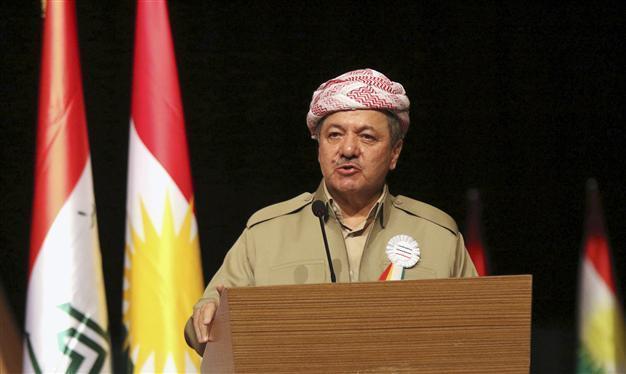'Legal vacuum' as Iraqi Kurd leader's term expires
ARBIL, Iraq - Agence France-Presse

Iraqi Kurdish regional President Massoud Barzani speaks during a ceremony in Dohuk, northern Iraq August 3, 2015. Reuters Photo
Iraqi Kurdistan president Massud Barzani's extended term expired on Aug. 20, leaving the autonomous region in a "legal vacuum" that Kurdish political parties are still trying to resolve.The Kurdish leadership dispute comes as Kurdistan faces a multitude of crises: the war against the Islamic State of Iraq and the Levant (ISIL) jihadist group, major financial problems and a Turkish bombing campaign targeting the outlawed Kurdistan Workers' Party (PKK) rebel group in the region.
"The region has entered a legal vacuum, and this is why we must address this issue," said Barzo Majid, from the regional parliament's Goran bloc, one of the main parties in the region.
If political parties cannot agree on a solution, the parliament speaker should "take up the position of the president of the region for a period of two months until elections are held," Majid said.
Barzani's ruling Kurdistan Democratic Party is against that proposal, and is pushing for his term to be extended for a second time.
Barzani, the son of revered Kurdish nationalist leader and KDP founder Mulla Mustafa Barzani, has been in office for 10 years -- two terms as president and a two-year extension in 2013.
His family has long been the dominant force in Kurdish politics, holding various top positions in the regional government.
"There is a meeting today (Aug. 20) between the Kurdistan parties," said Saadi Ahmed Bira, a leader in the Patriotic Union of Kurdistan, another key Kurdish party.
"But until now, we do not know if we will reach an agreement or not," Bira said.
Iraqi Kurdistan has its own government, security forces, borders and flag.
It is still dependent on the federal government for funds, but complains that Baghdad has either paid it less than its share of the budget, or not at all, and the region is independently exporting oil to boost its revenues.
















